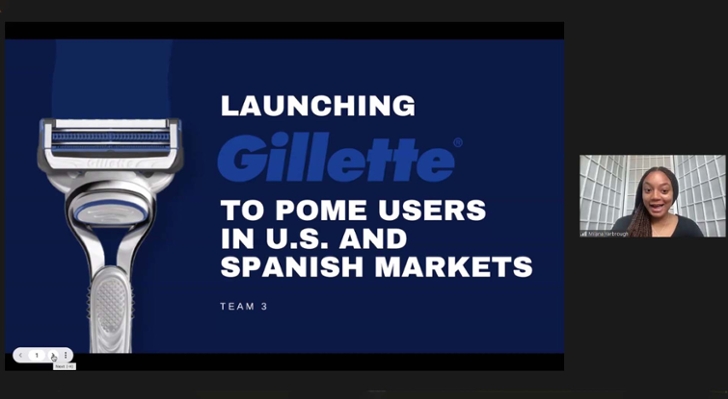When COVID gives you lemons: Marketing capstone adjusts to change


In late December, two dozen Farmer School students were ready for January to arrive, when they would board a plane to Spain to spend three weeks in a marketing capstone class. Then the Omicron variant of COVID-19 swept the world and plans … changed.
“Five days before departure, we got an email saying we were no longer going abroad, things had changed with government restrictions and borders. So it was then switched to online,” senior marketing major Madison Frindt said.
Farmer School marketing professor Gillian Oakenfull suddenly needed to pivot her KickGlass Marketing for Change class from an in-person experience on another continent to one that was just as educational and informative, while being done on a computer, and had only days to do it. “It was somewhat a lemons-to-lemonade scenario, but we had the technology to make it work. In some ways I could connect with them differently remotely,” she said. “And in some ways, we could make this more global because of being able to this remotely.”
The newly-restructured class had students taking on a new marketing challenge each week, with a Spanish angle to each and a presentation at the end of the week. The first week, Graeter’s Ice Cream vice president of marketing (and 1989 MU marketing graduate) Tim Philpott joined the class and tasked them with finding ways to market the company’s ice cream in Spain, then came back to hear their recommendations and provide feedback.
“We had to pick some flavors that would do well in the Spanish market with their consumers. And we all kind of went in thinking, ‘The most popular flavors, like the black raspberry chip, they're going to do well over there.’ But once we did the research and looked into what the Spaniards’ popular flavors are, why they like them, and why they eat ice cream, it made our decisions totally different,” senior marketing and finance major Nikki Staudt said.
The second week found the students looking at how to launch the FC Barcelona women’s soccer team brand within the U.S. “We got the assignment on Monday, then we literally just spent Tuesday and Wednesday working on it and then Thursday recording the presentation. That includes market research, landscape assessment, then revising, meeting with the professor, making changes, designing the slides, making them nice, doing scripts, assigning parts, doing everything in essentially two days,” senior human capital management major Robert Plotka said. “I would get on my laptop at 9:30 in the morning and I would not get off until at least five o'clock at night.”
For the finale, the student teams worked with Donato Diez, the Procter & Gamble brand director for shave care in Spain and Portugal, and Stephanie Osborn, Senior Brand Director for Gillette, North America, as the teams sought ways to improve on the company’s point-of-market entry programs. “Our team was on Zoom from probably 10 a.m. to 11 p.m.,” Frindt said. “We had to understand the Spanish customers, their different behaviors, their consumer motivations. Whatever we were discussing on the project, that's what we had to reflect on. And then we had to think of what would the ideas be to reach that market.”
And their findings and presentations made an impression on Diez. “I didn't know they only had four days. That increases my praises to all of you,” he said after the presentations. “It's very, very brilliant how you have articulated total thinking across the board. There were many ideas across the groups that could fit our purposes.”
Diez chose Staudt and Plotka’s team, which included Milana Yarbrough, Ethan Talbot, Bryce Martin, and Charlie Fry, as the best group from the final challenge. Frindt and her team -- Hannah Pompeo, Kati Vombergar, David Pannell, Tommy Lunsden, Michael Barone – were voted the KickGlass Challenge Champions by the entire class for their performance over the three challenges.
Despite not quite being the experience they signed up for, the students said they gained valuable knowledge and insight through the capstone class, even those who aren’t marketing majors. “When you have to do three different challenges three different ways and you have to get into that marketing brain every single time and not leave it, It I'll remember that for a while,” Plotka remarked. “I took away a great respect for marketing people in terms of the things they have to do and the creativity they have to find.”
“I was really proud of the work that we were putting in. You just had to be extremely dedicated and I'm going to take that process of how Dr. Oakenfull taught us to pull the background research and look for the ‘What’ and then the ‘So what?’ to present our findings of the why and how we're going to implement it,” Frindt said. “Focusing on the bigger picture and sticking with that idea along the way, I'll definitely be using that for my next group projects.”
“You have to learn that your assumptions might be incorrect and you have to be okay with changing the information that you think you know into something that is totally unprecedented, and you have to be adaptable,” Stoudt said. “I was able to really just focus in on this thing for three weeks, and this was like my life for three weeks. So it felt more real, like I was actually working for these clients, like I would be in the real world. I think in that way, it was a better experience.”

